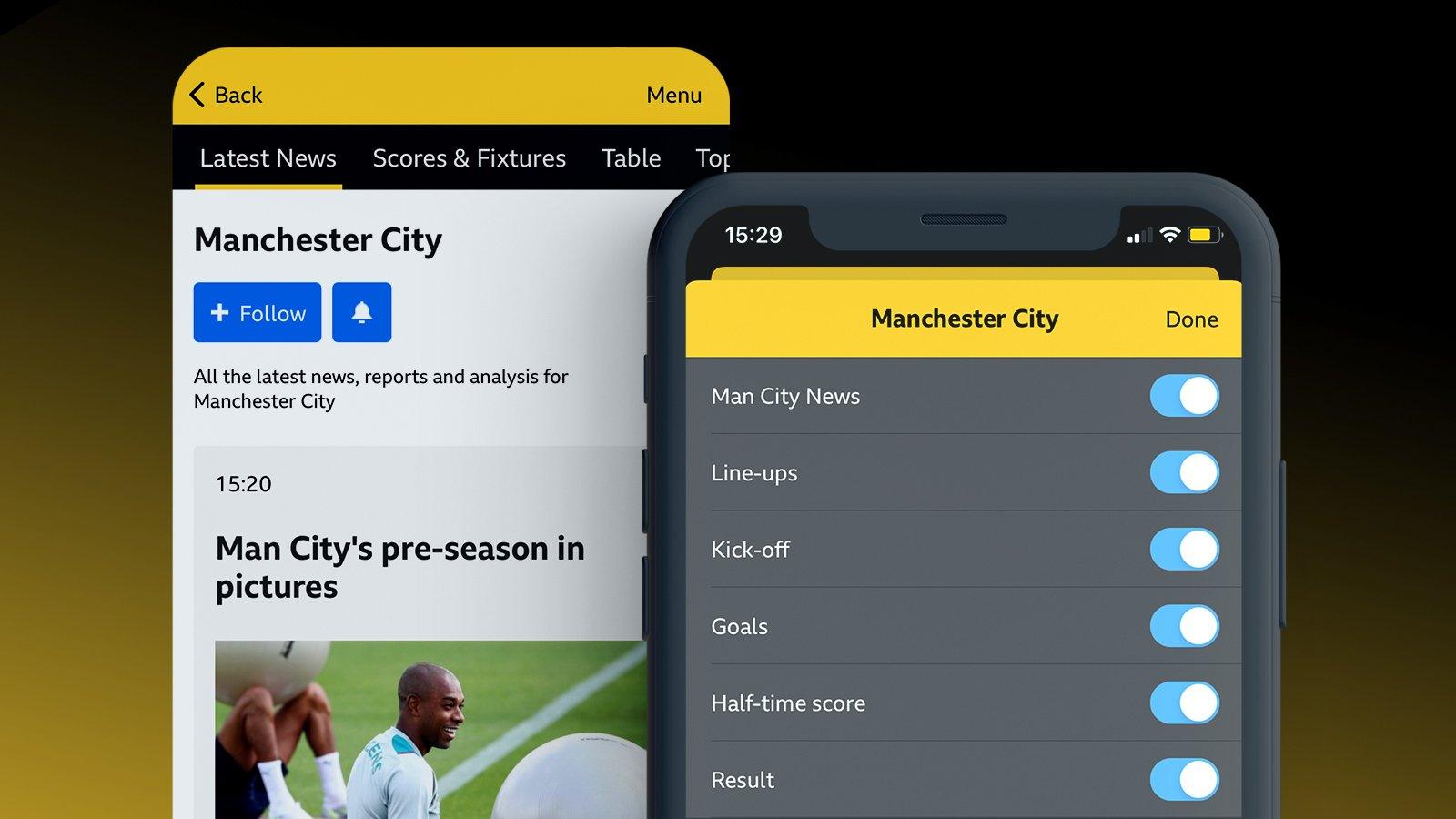'Engaging and courteous with a touch of steel'
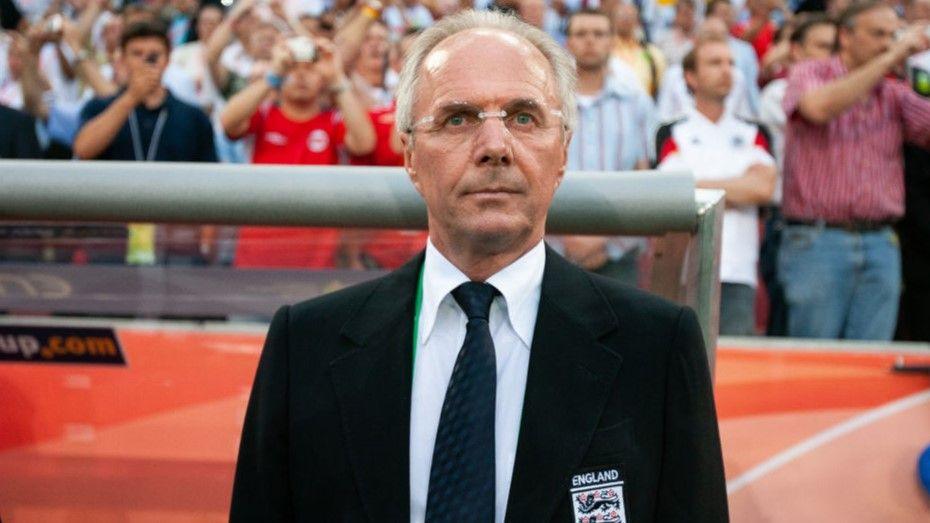
Sven-Goran Eriksson managed England at three major tournaments, including the 2002 and 2006 World Cups
- Published
Sven-Goran Eriksson, who has died aged 76, is best remembered as England's first foreign manager and the man who presided over the country's so-called 'Golden Generation' during his time in charge.
Eriksson's colourful private life has been well chronicled, while an eventful England managerial reign included a brush with an infamous tabloid 'Fake Sheikh' as well as heavy flirtations with Chelsea and Manchester United.
The Eriksson sideshow often detracted from the successes he enjoyed as a club manager around Europe before he was announced as Kevin Keegan's successor in November 2000, although his England tenure is regarded as one of under-achievement given the riches he had at his disposal.
At his peak, Eriksson was one of the game's finest coaches as he collected both domestic and European honours with regularity, something he was unable to replicate with England.
Eriksson will, however, always have the memories of his most stunning night in charge, when Germany were beaten 5-1 in a World Cup qualifier in Munich's famous Olympic Stadium in September 2001.
The Football Association's then chief executive Adam Crozier described Eriksson as "the unanimous choice of our selection team" when he was handed a five-year deal to tempt him away from Lazio, resigning early from the Italian club to assume his England duties in January 2001.
Eriksson arrived with a glowing reputation as a shrewd tactician, the model of Scandinavian cool who would provide a stark contrast from Keegan, who relied heavily on the raw emotion that prompted him to quit in a toilet after a 1-0 defeat by Germany in October 2000, the final game at the old Wembley.
The Swede also brought a track record of success with him to the FA's headquarters at Lancaster Gate that provided much optimism.
Early European success
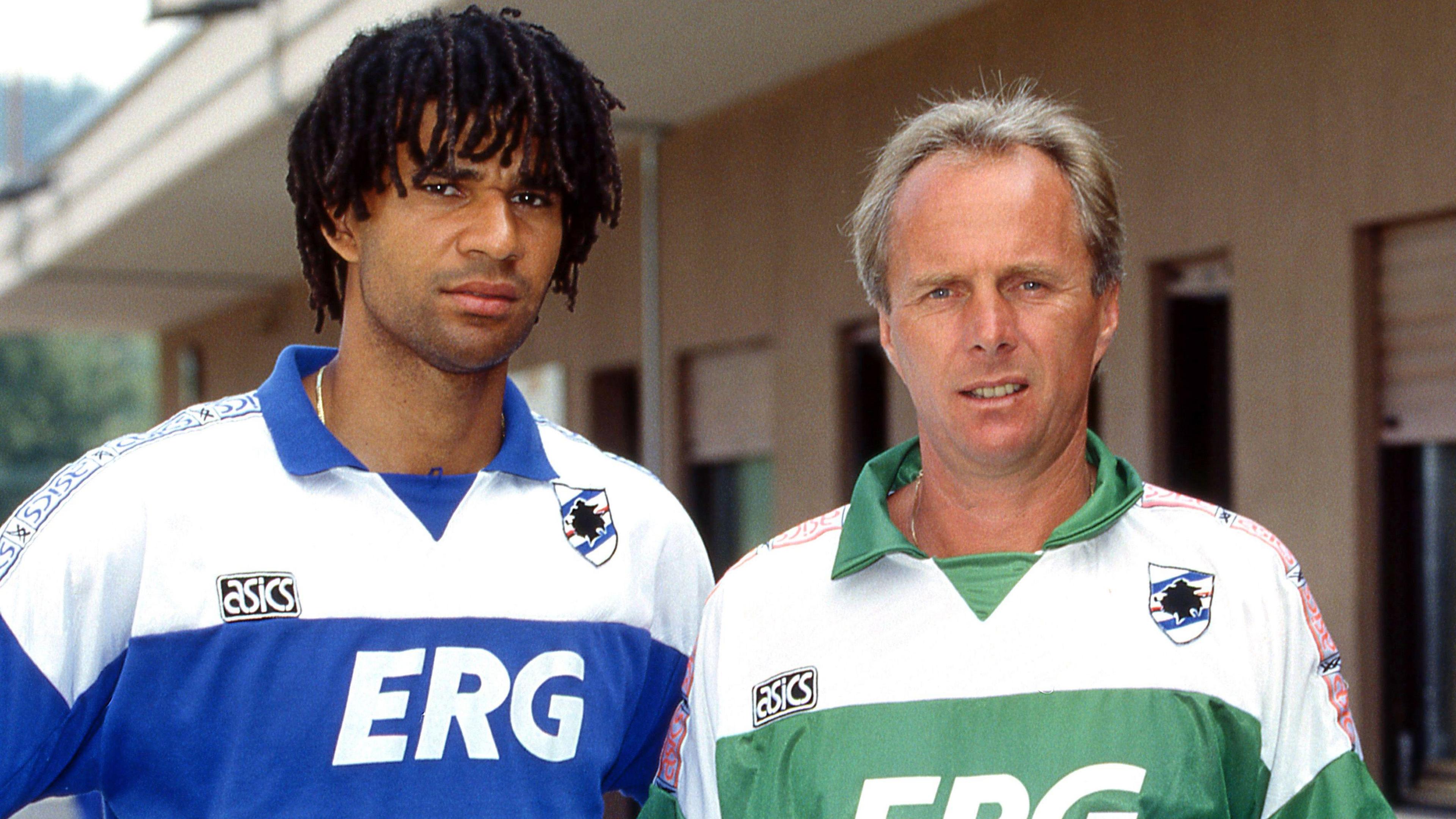
Eriksson spent five years as manager of Sampdoria, taking charge of players such as Netherlands superstar Ruud Gullit
Eriksson first came to wide prominence when he led IFK Gothenburg to a Uefa Cup triumph in 1982, beating Hamburg 4-0 on aggregate over two legs to give the Swedish club their first European success.
It attracted the attention of Benfica, where he won two titles but could not repeat his Uefa Cup success, losing the 1983 final to Anderlecht.
He had spells at Roma, with whom he won the Coppa Italia, and Fiorentina before returning to the Eagles in Lisbon, leading them to the 1990 European Cup final only to lose 1-0 to Arrigo Sacchi's legendary AC Milan side.
There was a bizarre episode in Eriksson's career in December 1996 when he agreed to become manager of Blackburn Rovers for the start of the 1997-98 season. He reneged on this agreement three months later, leaving fellow future England boss Roy Hodgson to take charge at Ewood Park, while Eriksson was appointed as Lazio coach.
It was at Lazio, after winning another Coppa Italia with Sampdoria in 1994, that Eriksson won the hearts and minds of the FA as the search for Keegan's successor started.
Eriksson's Lazio won the European Cup Winners' Cup in 1999 with a 2-1 victory over Mallorca at Villa Park, having lost to Inter Milan in the previous season's Uefa Cup final.
Lazio claimed the Coppa Italia twice then won Serie A in 1999-2000 under Eriksson, making him the top target for England.
'Forever grateful' - Beckham leads Eriksson tributes
- Published26 August 2024
England's first foreign coach
Sven-Goran Eriksson on the reaction to his becoming England's first foreign coach
Eriksson made a superb start with England, especially with that win against Germany in the qualifying campaign for the 2002 World Cup in Japan and South Korea, although an automatic place was only secured by David Beckham's last-ditch free-kick in a 2-2 draw against Greece.
Indeed, Eriksson's stock was so high around this time that when Sir Alex Ferguson announced he would be quitting Manchester United in 2002, only to later change his mind, it was widely assumed the Swede would be his replacement at Old Trafford.
That World Cup campaign set the tone for Eriksson's England career, with moments of promise ultimately swallowed up by a sense of under-achievement.
The high point was a group stage win over Argentina, captain Beckham once again the hero with the only goal from the penalty spot underneath the spectacular Sapporo Dome.
Beckham, however, was clearly not fully over a foot injury and England's lack of fitness haunted them in the searing heat of Shizuoka in the quarter-final against Brazil.
Michael Owen gave them the lead but goalkeeper David Seaman's error proved decisive when he was caught badly out of position from Ronaldinho's free-kick to give the eventual World Cup winners a 2-1 victory.
If Eriksson was to look back on one tournament as England's big missed opportunity, then Euro 2004 in Portugal must surely be the one.
It was the summer of 'Roomania' when Everton's 17-year-old striker Wayne Rooney caused a global sensation as he spearheaded England's, and Eriksson's, shot at glory.
After defeat by France, Rooney scored twice in wins against Switzerland and Croatia to set up a quarter-final against the hosts, only to break his foot early on with England leading 1-0 through another Owen goal.
The game eventually finished 2-2 with England losing on penalties, as they did against the same opponents two years later at the same stage of the World Cup in Germany.
Euro 2004 was a desperate disappointment, the tournament won by rank outsiders Greece as England missed out again despite having a side overflowing with world-class players.
England farewell and the 'Fake Sheikh'
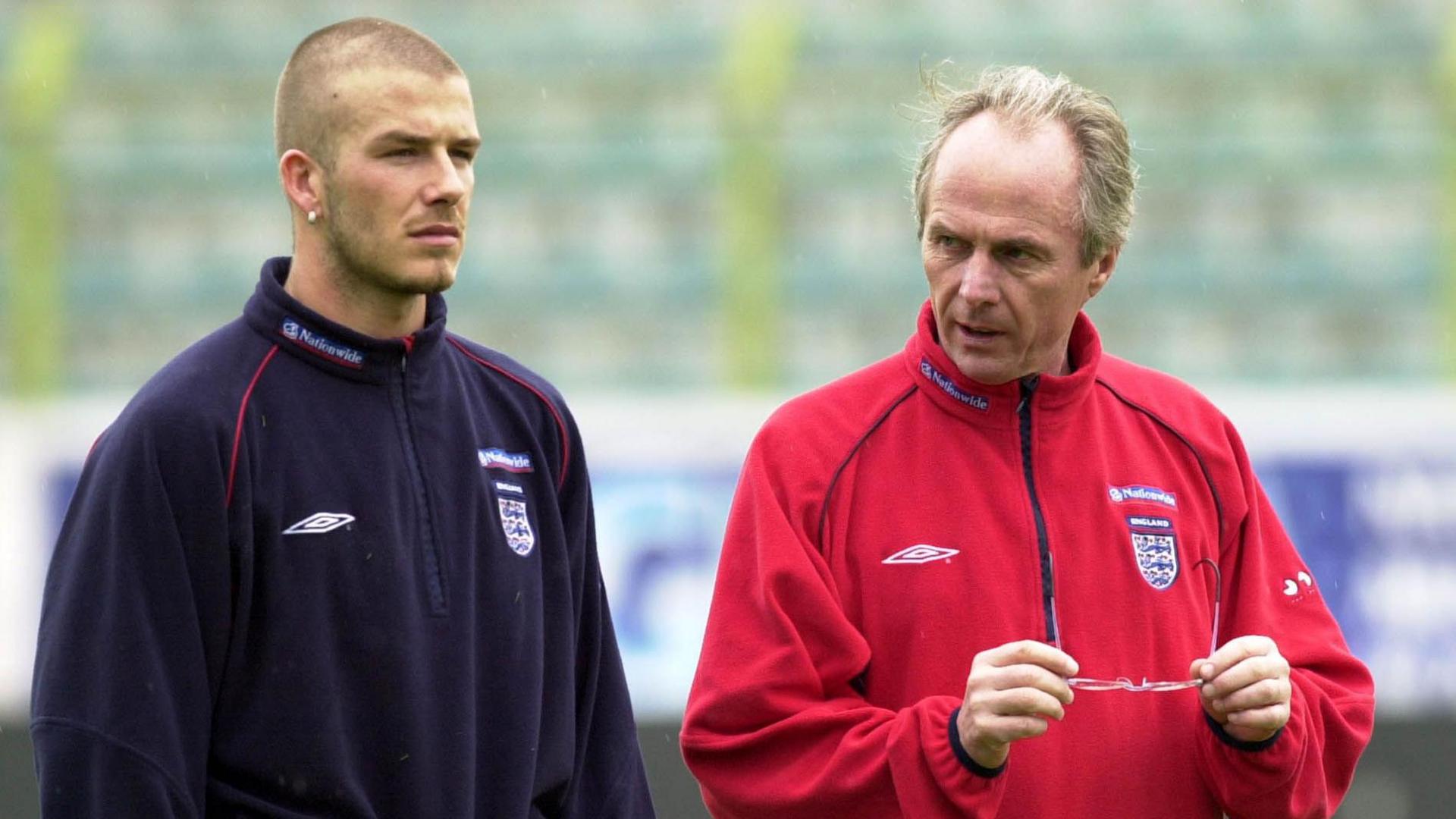
David Beckham was England captain during Eriksson's time in charge of the Three Lions
The 2006 World Cup was the final curtain for Eriksson, the manager who promised so much and had so much talent to utilise, and yet could not make that final leap to the first England success since the 1966 World Cup.
The end came a few months after Eriksson fell into a Sunday tabloid newspaper's 'Fake Sheikh' sting, enjoying fine dining and vintage champagne before delivering a series of indiscreet revelations.
He claimed to the News of the World's undercover reporter that Owen was unhappy at Newcastle United, while he himself could leave the England job to join Aston Villa, luring Beckham away from Real Madrid to Villa Park in the process.
Eriksson was an engaging, courteous character with an uncanny ability to smile as he deflected away various personal scandals, never allowing his inquisitors to lay a glove on him. He rarely, if ever, demonstrated anger even in the tightest of spots.
He also had a touch of steel, famously infuriating Manchester United boss Ferguson when insisting an injured Rooney would be part of the 2006 World Cup squad once he was declared fit, whether the great Scot liked it or not.
Eriksson's insistence backfired as a frustrated Rooney, not fully fit after breaking a metatarsal bone in his foot playing for United and nowhere near his best, was sent off for stamping on Portugal defender Ricardo Carvalho in that quarter-final exit in Gelsenkirchen.
If Eriksson's time in charge is examined now, those of us who followed it would say he was too much in thrall to big names such as Beckham, still selecting him when the midfielder was clearly struggling with injury.
He was, to an extent, starstruck. It led him to try to pack his side with his finest players rather than adopting pragmatism to get his best team.
Eriksson wanted a midfield quartet of Beckham, Steven Gerrard, Frank Lampard and Paul Scholes. It was understandable, but it also lacked balance, with Scholes' deployment in an unfamiliar role wide on the left arguably pushing a truly world-class talent into early international retirement.
He also had difficulties building a unified squad with divisions along club lines, especially involving players from Chelsea, Liverpool and Manchester United, but there is no doubt Eriksson could, and perhaps should, have been the manager to end England's wait for a trophy.
Return to club management
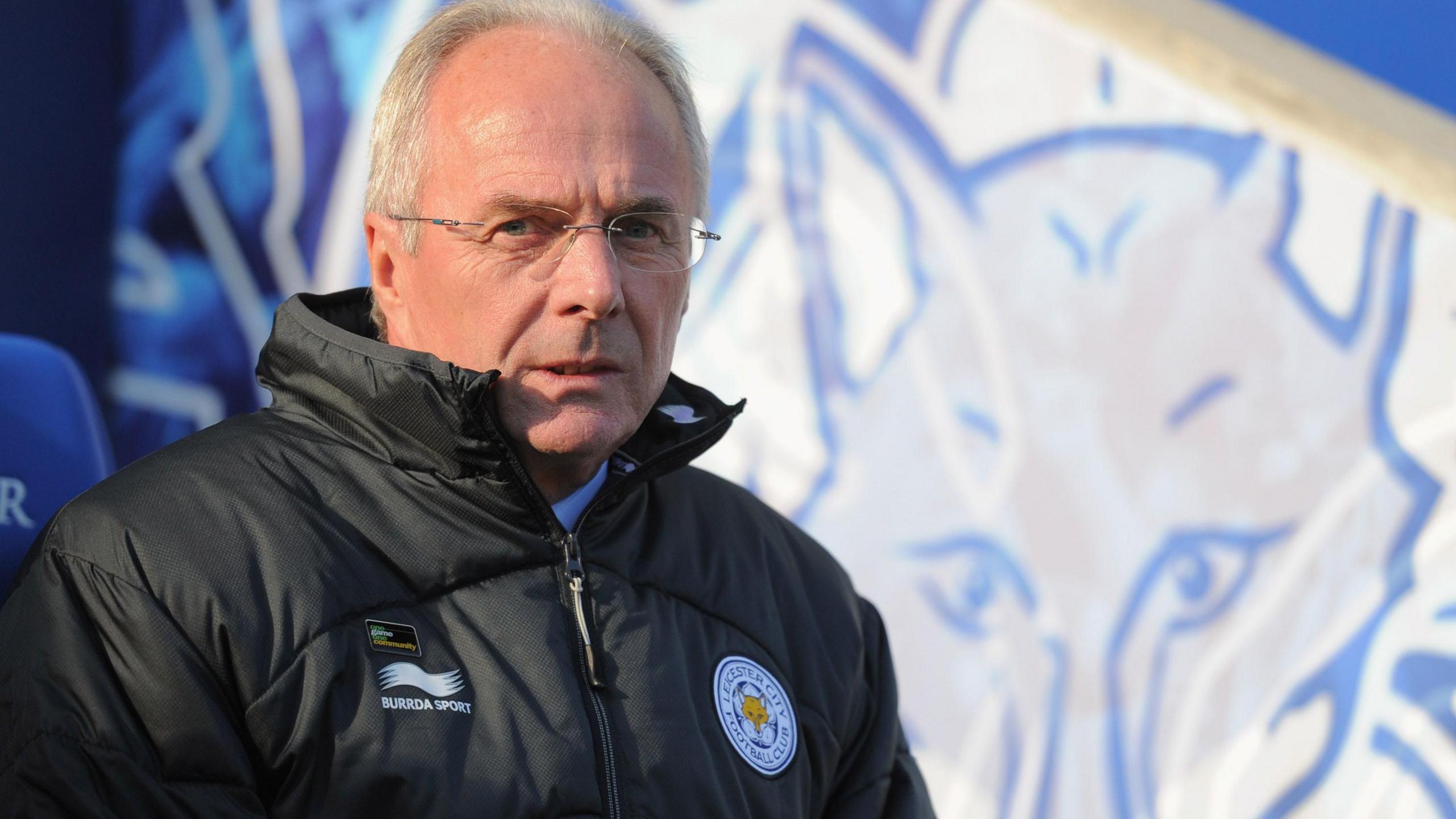
Eriksson managed several club sides after leaving his job with England, including Manchester City and Leicester
Life after England was a nomadic one for the cosmopolitan Eriksson, although his next stop was still in England as he was appointed manager of Manchester City in July 2007, brought in by new owner and former Thailand president Thaksin Shinawatra.
Eriksson started well, with City topping the table early on. They even did a league double over rivals Manchester United for the first time in 40 years, but there was a slide and Thaksin announced in April that the Swede would leave at the end of the season.
Many City players and fans were infuriated, a final position of ninth very respectable, despite an 8-1 loss at Middlesbrough on the season's final day that some put down to the squad's upset at the decision to sack Eriksson.
He was hugely popular with those who worked with him, his well-publicised escapades away from the game actually endearing him to many of those players in his charge, who felt it showed a human - if somewhat flawed - side to his nature.
After a year in charge of Mexico, Eriksson had an almost surreal spell as director of football at League Two side Notts County between July 2009 and February 2010.
Lured by the promise of vast finances and high ambition, Kasper Schmeichel and Sol Campbell were attracted - the latter for only one game - before serious financial problems emerged as a complex international fraud was unravelled.
Eriksson returned to international football with the Ivory Coast before being appointed Leicester City manager in October 2010. The Foxes finished 10th in his first season but a push for promotion to the Premier League never materialised and he left after a year.
His final postings were in the Far East with three Chinese club sides and the Philippines national team before this most enduring, colourful personality retired and returned to live in his beloved Sweden.
And after disclosing his terminal cancer diagnosis in January 2024, the lifelong Liverpool fan was able to live out one dream two months later when he managed a Liverpool Legends team in a match against Ajax at Anfield.
"To finish with Liverpool, it can't be much better than that," he said.
Sven-Goran Eriksson: Former England boss on fulfilling 'dream to manage Liverpool legends
